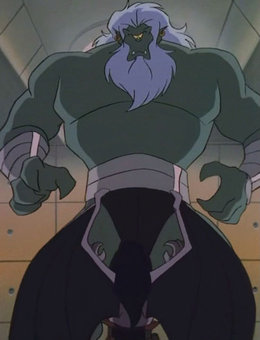Difference between revisions of "Proteus"
Phoenician (talk | contribs) |
Phoenician (talk | contribs) |
||
| Line 22: | Line 22: | ||
==Real World History== | ==Real World History== | ||
| − | Proteus is named after a minor sea-god in Greek mythology, who looked after seals and served as their herdsman. Like the Proteus of ''Gargoyles'', he was a famous shape-shifter, although much more benevolent by nature; he was also very wise, and could even foresee the future, although he would only reveal what he knew to somebody who had overpowered him. For example, as recounted in Book Four of Homer's ''Odyssey'', when King Menelaus of Sparta and his followers were shipwrecked off the coast of Egypt on their way home from the Trojan War, they learned that in order to discover how to return to Greece, they must capture Proteus and discover what they needed to know from him. Menelaus wrestled with Proteus, who shifted his shape into many forms in an effort to escape; Menelaus persisted, however, and at last Proteus gave him the information that he needed to know. | + | Proteus is named after a minor sea-god in Greek mythology, who looked after seals and served as their herdsman. Like the Proteus of ''[[Gargoyles (TV series)|Gargoyles]]'', he was a famous shape-shifter, although much more benevolent by nature; he was also very wise, and could even foresee the future, although he would only reveal what he knew to somebody who had overpowered him. For example, as recounted in Book Four of Homer's ''Odyssey'', when King Menelaus of Sparta and his followers were shipwrecked off the coast of Egypt on their way home from the Trojan War, they learned that in order to discover how to return to Greece, they must capture Proteus and discover what they needed to know from him. Menelaus wrestled with Proteus, who shifted his shape into many forms in an effort to escape; Menelaus persisted, however, and at last Proteus gave him the information that he needed to know. |
[[William Shakespeare]] named one of the leads of his comedy ''The Two Gentlemen of Verona'' after Proteus; this Proteus more closely resembled the Proteus of ''Gargoyles'' in character, being a conniving schemer who even betrays his best friend, Valentine, and deserts his original girl-friend, Julia, after being smitten with Sylvia (whom Valentine is wooing). He repents of his evil ways at the end, however (unlike the Proteus of ''Gargoyles''). | [[William Shakespeare]] named one of the leads of his comedy ''The Two Gentlemen of Verona'' after Proteus; this Proteus more closely resembled the Proteus of ''Gargoyles'' in character, being a conniving schemer who even betrays his best friend, Valentine, and deserts his original girl-friend, Julia, after being smitten with Sylvia (whom Valentine is wooing). He repents of his evil ways at the end, however (unlike the Proteus of ''Gargoyles''). | ||
Revision as of 19:11, 22 November 2015
Proteus is a New Olympian, and shape-shifting psychopath. He is named after and is likely a descendant of the legendary member of the Third Race. [1]
Contents
History
Proteus has attempted many times to wreak havoc on New Olympus and escape into the outside world, presumably to create more trouble there for his own amusement. During his (at this time of writing) penultimate attempt to escape New Olympus, he murdered Taurus's Father, who was then Chief of Security. Afterwards, he was locked up in a force field cell in New Olympus's prison.
When Goliath, Elisa, Angela, and Bronx came to New Olympus on the Avalon World Tour, Proteus decided to take advantage of their arrival to make a fresh escape. After Elisa was locked up by Taurus, Proteus first masqueraded as her to trick Goliath into freeing him, and then, after subduing Goliath and imprisoning him in his cell, shape-shifted into Goliath to break Elisa out, hoping to trick her into leading him back to the skiff. First, however, he decided to enter the Columnadium and overload the power supply, which would have destroyed New Olympus. Fortunately, Elisa (who had by now deduced Proteus' true identity) and Taurus arrived in time to foil his scheme and overpower him. Proteus is currently back in prison again. ("The New Olympians")
Characteristics
Proteus is a shape-shifter, who can mimic any living thing, even distinct individuals, such as Goliath, Elisa, and Taurus. His shape-shifting presumably does not give him the full nature of what he masquerades as, however, for when he took on the form of Goliath, he did not undergo stone sleep in the daytime. In addition, Proteus' doesn't show the exact mannerisms of those he poses as.
By nature, he is thoroughly evil and corrupt, delighting in deceit, psychological torture (he likes to taunt Taurus by shape-shifting into the form of his father), and senseless destruction.
Appearances
- "The New Olympians" (First Appearance)
Apocrypha
The Goliath Chronicles
Proteus escapes New Olympus and ends up in Manhattan to seek revenge on both Goliath and Elisa. He starts by posing as Goliath and prevents a theft in a dangerous manner. Afterwards, he poses as Elisa to trap and capture Goliath. He is eventually caught and defeated by Goliath, Elisa, Angela and Hudson along with Taurus. ("Seeing Isn't Believing")
Real World History
Proteus is named after a minor sea-god in Greek mythology, who looked after seals and served as their herdsman. Like the Proteus of Gargoyles, he was a famous shape-shifter, although much more benevolent by nature; he was also very wise, and could even foresee the future, although he would only reveal what he knew to somebody who had overpowered him. For example, as recounted in Book Four of Homer's Odyssey, when King Menelaus of Sparta and his followers were shipwrecked off the coast of Egypt on their way home from the Trojan War, they learned that in order to discover how to return to Greece, they must capture Proteus and discover what they needed to know from him. Menelaus wrestled with Proteus, who shifted his shape into many forms in an effort to escape; Menelaus persisted, however, and at last Proteus gave him the information that he needed to know.
William Shakespeare named one of the leads of his comedy The Two Gentlemen of Verona after Proteus; this Proteus more closely resembled the Proteus of Gargoyles in character, being a conniving schemer who even betrays his best friend, Valentine, and deserts his original girl-friend, Julia, after being smitten with Sylvia (whom Valentine is wooing). He repents of his evil ways at the end, however (unlike the Proteus of Gargoyles).
Production Background
Voice Actor: Roddy McDowall
See also
- Proteus (mythology) at Wikipedia, the Free Encyclopedia
- Proteus (mythology) at the Theoi Project

